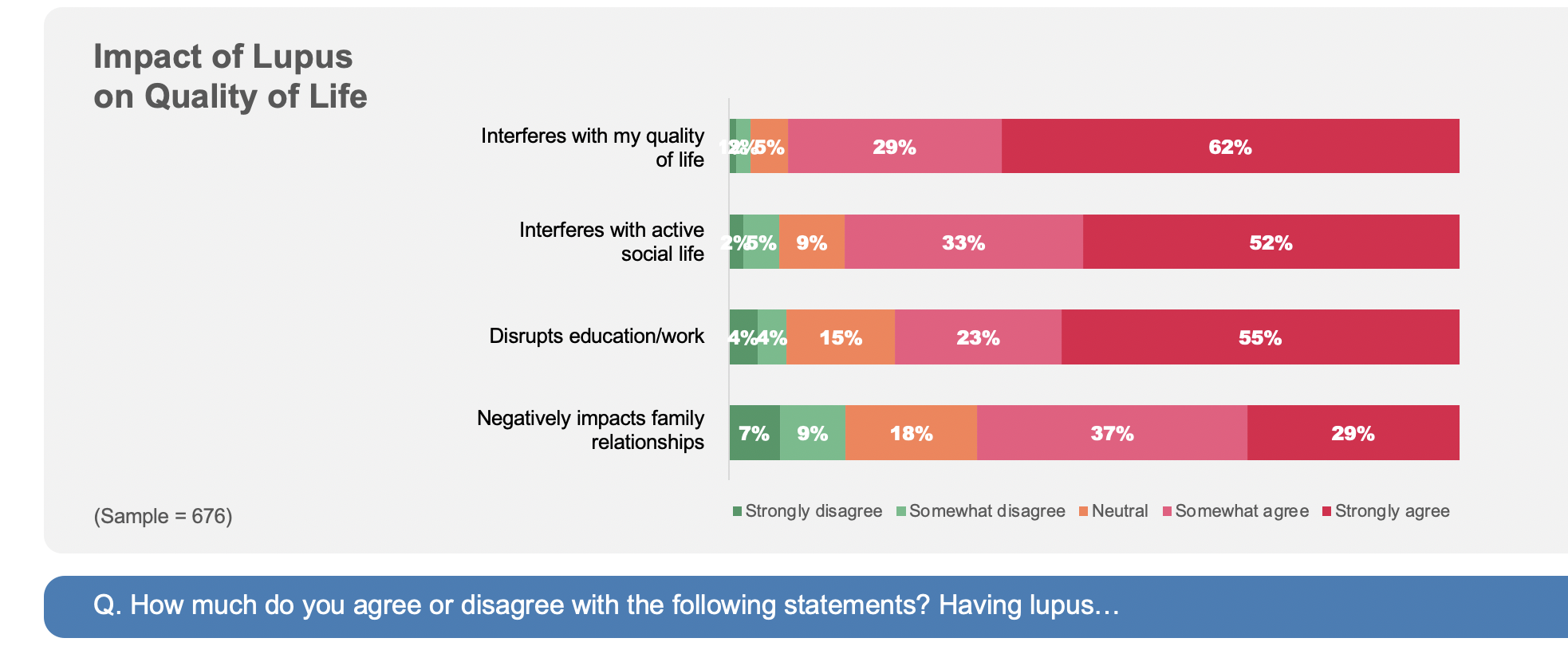Session Information
Date: Tuesday, November 14, 2023
Title: (2257–2325) SLE – Diagnosis, Manifestations, & Outcomes Poster III
Session Type: Poster Session C
Session Time: 9:00AM-11:00AM
Background/Purpose: Research was undertaken to better understand how people living with lupus describe its sum total impact on their lives including work, challenges with relationships and its toll on mental health.
Methods: In August 2022, an email invitation to an online survey was sent to US members of MyLupusTeam, a social network of over 218,000 members. In total, 676 members diagnosed with systemic lupuserythematosus completed the 31-question survey regarding experiences with lupus and impact of the disease on everyday life.
Results: The far-reaching impact of lupus was evident in that most reported that lupus had a negative impact on overall quality of life (91%), interferes with their social life (84%), disrupts education/work (78%), and negatively impacts family relationships (66%). These lupus patients also found it hard to do everyday chores (89%) and hard to get around physically (79%). In total, only 7% felt their lupus related health was excellent or very good. “The pain that I have means I can’t do anything.”The emotional toll of lupus manifested in feeling stressed (88%), anxious/depressed (83%) or judged by others (63%). In fact, a large number indicated depression (52%), or anxiety (55%) as diagnosed comorbidities. “Visible symptoms appear on our faces or bodies that cause us to feel so low and embarrassed to show our faces in public.” Despite the many obstacles, respondents were proactive in managing lupus.Most were able to stay on their prescribed medications (83%). And only 12% are not on any medication to treat lupus and its symptoms.However, 32% struggled to afford their medical expenses and these patients were much more likely be in poor health (75% versus 55% among those who could easily afford their medications).
Conclusion: Understanding the physical, emotional, and quality of life impact of lupus, can help rheumatologists provide a more holistic approach to treating lupus patients. This includes listening to patient concerns and addressing the symptoms of lupus, including pain, depression, and fatigue, and not just disease progression. Importantly, by addressing the mental health aspects of lupus, rheumatologists can help create better health outcomes, including effective self-care regimens and an improved quality of life.
To cite this abstract in AMA style:
Schneider B. Patient Reported Impact of Lupus on Quality of Life [abstract]. Arthritis Rheumatol. 2023; 75 (suppl 9). https://acrabstracts.org/abstract/patient-reported-impact-of-lupus-on-quality-of-life-2/. Accessed .« Back to ACR Convergence 2023
ACR Meeting Abstracts - https://acrabstracts.org/abstract/patient-reported-impact-of-lupus-on-quality-of-life-2/


